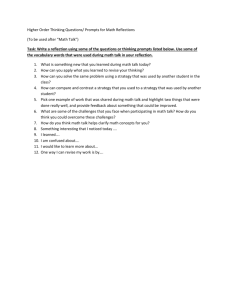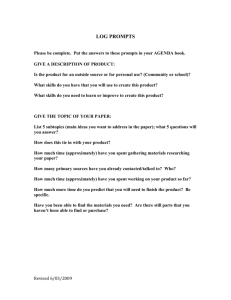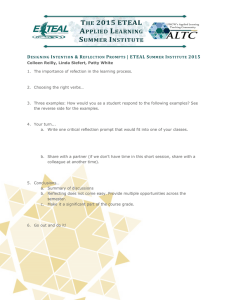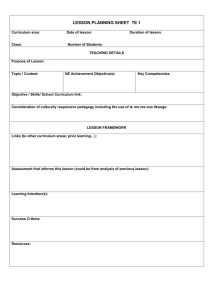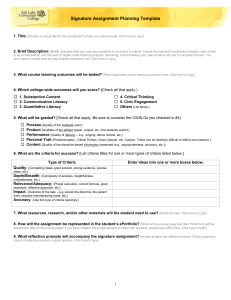ETEAL Critical Reflection Prompts and Resources The Importance of Critical Reflection
advertisement
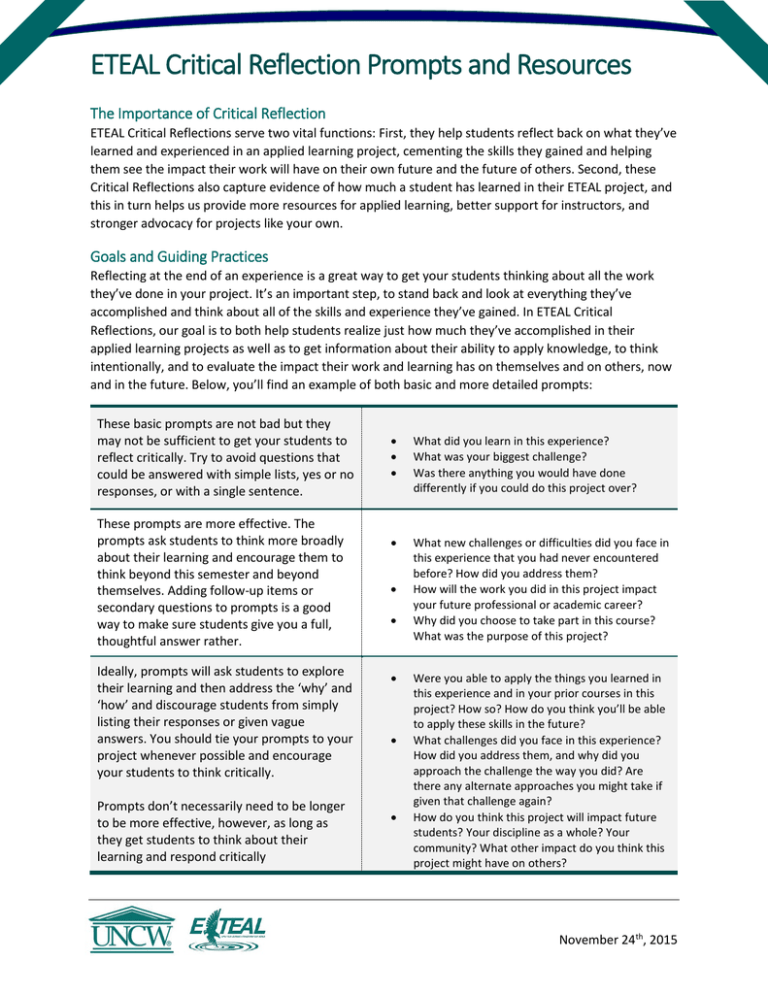
ETEAL Critical Reflection Prompts and Resources The Importance of Critical Reflection ETEAL Critical Reflections serve two vital functions: First, they help students reflect back on what they’ve learned and experienced in an applied learning project, cementing the skills they gained and helping them see the impact their work will have on their own future and the future of others. Second, these Critical Reflections also capture evidence of how much a student has learned in their ETEAL project, and this in turn helps us provide more resources for applied learning, better support for instructors, and stronger advocacy for projects like your own. Goals and Guiding Practices Reflecting at the end of an experience is a great way to get your students thinking about all the work they’ve done in your project. It’s an important step, to stand back and look at everything they’ve accomplished and think about all of the skills and experience they’ve gained. In ETEAL Critical Reflections, our goal is to both help students realize just how much they’ve accomplished in their applied learning projects as well as to get information about their ability to apply knowledge, to think intentionally, and to evaluate the impact their work and learning has on themselves and on others, now and in the future. Below, you’ll find an example of both basic and more detailed prompts: These basic prompts are not bad but they may not be sufficient to get your students to reflect critically. Try to avoid questions that could be answered with simple lists, yes or no responses, or with a single sentence. These prompts are more effective. The prompts ask students to think more broadly about their learning and encourage them to think beyond this semester and beyond themselves. Adding follow-up items or secondary questions to prompts is a good way to make sure students give you a full, thoughtful answer rather. Ideally, prompts will ask students to explore their learning and then address the ‘why’ and ‘how’ and discourage students from simply listing their responses or given vague answers. You should tie your prompts to your project whenever possible and encourage your students to think critically. Prompts don’t necessarily need to be longer to be more effective, however, as long as they get students to think about their learning and respond critically • • • What did you learn in this experience? What was your biggest challenge? Was there anything you would have done differently if you could do this project over? • What new challenges or difficulties did you face in this experience that you had never encountered before? How did you address them? How will the work you did in this project impact your future professional or academic career? Why did you choose to take part in this course? What was the purpose of this project? • • • • • Were you able to apply the things you learned in this experience and in your prior courses in this project? How so? How do you think you’ll be able to apply these skills in the future? What challenges did you face in this experience? How did you address them, and why did you approach the challenge the way you did? Are there any alternate approaches you might take if given that challenge again? How do you think this project will impact future students? Your discipline as a whole? Your community? What other impact do you think this project might have on others? November 24th, 2015 ETEAL Critical Reflection: Example final reflection prompts Intention From the Rubric: “[The Student] Explains in depth the purpose for engaging in the experience and directly links it to personal educational development through expected educational outcomes.” Intention should be captured in your intention reflections, before your project begins but after students have been brief on what to expect. For more information on Intention Reflections and prompts, see our Intention guide on the ETEAL website: Intention Guide and Sample Prompts Application of Knowledge prompts should be tailored to the project and to your discipline whenever possible. Application of Knowledge • From the Rubric: “[Student] Connects and extends • previous or current coursework and synthesizes it in an innovative way within the applied learning experience.” • • Critical Reflection From the Rubric: “[The Student] Envisions a future direction for growth and/or application of strengths, and reveals significantly broader perspectives about personal educational development.” • • • Evaluation of Impact From the Rubric: “[The Student] Considers the results of the experience with a thoughtful evaluation of its impact on others or on the profession/field.” • • Connect your previous learning to what you did in this experience, providing details of what knowledge you drew on and how it affected your performance. Discuss the relevant theories, ideas, and skills that you were able to apply during this experience or that helped guide this experience. Describe how the courses, methods and tools you’ve been exposed to previously (or are being exposed to this semester) impacted your success in this course. Provide 1-3 specific examples to demonstrate application to the [this] class. How do you think [the skills gained in this project] will be useful for you in a professional setting? Why will it be useful in these ways? Predict how you anticipate this experience will influence your approach as you go forward in your major and/or after graduation. How did the projects and the overall learning experience impact your view/impression of ecology? How did the projects and the overall learning experience impact your view/impression of global change (climate, sea level, anthropogenic impacts, etc.)? Summarize two things you did during the experience and examine the results of these actions on the project, on others, on the discipline in general, and on yourself (whether intended or not). Analyze the implications of what you learned from this experience on your future in terms of education or career goals. Describe your learning from this experience as it relates to your future in nursing and the impact of nursing as a profession. (This learning matters because…In light of this learning I will – consider how the learning has value in this situation and in broader terms). November 24th, 2015
